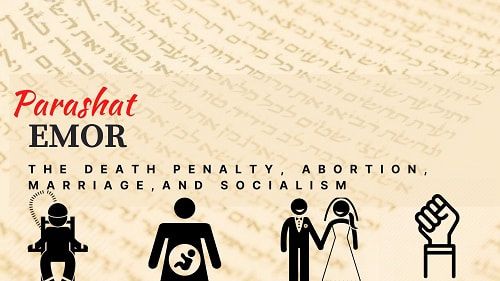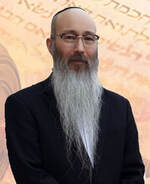|
By: HaRav Menashe Sasson Reporting from Jerusalem, Israel Published in the U.S.A. Parashat Emor discusses capital punishment, among other things, and says, in no uncertain terms that “he who mortally strikes [יכה] any person shall surely be put to death.” Vayyiqra 24:17. “[A]nd he that strikes [but does not kill] [מכה] another person, he shall be put to death.” Id. 24:21. Taken literally, the pasuk that says “he who mortally strikes [יכה] any person shall surely be put to death” could be understood to mean that a person may not kill another person under any circumstances, including killing in self-defense. Additionally, if a person who strikes another person is to be put to death, why does the Torah need to tell us that a person who mortally strikes another person must also to be put to death? If one is to be put to death for merely striking another person, then surely mortally striking another person would also subject the offender to the death penalty. In Parashat Mishpatim, we learn that: “If a thief is discovered while tunneling in, and he is struck and dies, there is no blood-guilt on his account. If the sun shone upon him, there is blood-guilt on his account.” Shemot 22:1-2. The Talmud explains that “[i]t is . . . assumed that before someone burglarizes a house, he [has already] decide[d] to kill the occupant, should it become necessary to do so. For this reason, the occupant is permitted to kill the burglar.” T.B., Masekat Sanhedrin, 72a. Additionally, the Rambam, in his Mishneh Torah, articulates a number of laws relating to other justified killings, including those which occur during war. See, e.g., M.T. Hilchot Melachim U’Milchamoteiheim 6-8, 12, 13. Thus, we learn that the term “mortally strike [יכה]” does not include cases of self-defense or other forms of justified killing. As for one who merely “strikes [מכה] another person,” without killing that person, the great commentator Rashi (1040 – 1105 C.E., France) explained that this pasuk refers to one who strikes his father or mother. Although the State of Israel has a law that permits the imposition of the death penalty, the only crimes that, under current Israeli law, are subject to the death penalty are certain war crimes and certain crimes against the government. Murder is not punishable by death. To date, Israel has executed only two people, Adolf Eichmann and Meir Tobianski. Meir Tobianski was an officer in the IDF who was accused of treason. He was exonerated after his execution. With the exception of the United States, all western countries have abolished capital punishment. Additionally, many U.S. states have either eliminated capital punishment altogether, or, like California, they simply decline to execute those who have been sentenced to death. Of the other countries that still retain the death penalty, the majority are either Muslim or Asian. Almost all countries and states that have abolished the death penalty have also legalized or otherwise facilitated abortion as a means of birth control. Since it is illogical to refrain from executing those who commit murder, but to simultaneously legalize and promote elective abortion, the reason for abolishing the death penalty cannot be based on a reverence and respect for life. There must be another reason. Countries (such as Israel) and states that have abolished the death penalty are also likely to enact, or have enacted, laws which severely limit a person’s legal ability to protect himself with privately-owned firearms or other weapons. However, numerous studies have repeatedly shown that rates of violent crime are consistently lower in jurisdictions where law-abiding citizens are allowed to own firearms, as compared to jurisdictions where the law discourages self-defense. As with the death penalty, the reason for laws which restrict a person’s legal ability to protect himself cannot, logically, be based on a reverence and respect for life. These same countries – those that have abolished the death penalty, allow elective abortion, and limit the right to self-defense – also champion the concept of “equality.” The concept of “equality,” however, is tricky. If everyone is to be “equal,” then there is no longer a reason to require that the parties to a marriage be of opposite genders. This novel, new definition of “marriage,” however, rejects thousands of years of tradition, in favor of a supposedly more “enlightened” younger generation. Also, in the name of equality, we see these same Western countries moving away from free-markets and toward centrally-planned economies. The details of how this is occurring, whether the state owns the means of production or merely controls privately-owned companies that own the means of production, is irrelevant. What is important, however, is that there is a constant push away from free-markets and toward a centrally-planned economy, all under the guise of so-called “equality.” What we see is that those who would abolish the death penalty, legalize elective abortion, criminalize self-defense, discard thousands of years of tradition by legalizing homosexual so-called “marriage,” and substitute a centrally-planned economy for the free-market, have a unified agenda. But what is this unified agenda? What is the common thread that connects each of these seemingly diverse and unrelated topics? The answer, of course, is simple. The unifying aspect of all of these trends is a rejection of Torah. As we see in Parashat Emor, the Torah mandates the imposition of the death penalty under certain circumstances. In other areas of the Torah, we learn that elective abortion is a sin; that self-defense is not only permitted, but actually required under certain circumstances; that homosexual conduct is an “abomination;” and that a free-market is the economic system mandated by the Torah. Last, but certainly not least, we see that the countries which reject Torah principles also deny the existence of HaShem. They teach their children a version of the theory of evolution which presupposes the world was not created as described in Sefer Bereshit, but rather, that human existence is merely the result of some unexplainable accident. Unlike some other religions, Judaism understands that one can only come to accept the truth of the Torah willingly and voluntarily. In order for a person to exercise his free-will and accept the truth of Torah, there must exist an alternative for him to choose. Thus, in order for “good” to exist in this world, “evil” must also exist. May we all be blessed to see and accept the absolute wisdom of Torah and to become increasingly closer to HaShem through our study of His Torah. שבת שלום Shabbat Shalom! Copyright © The Israel Foundation. All Rights Reserved.
0 Comments
Your comment will be posted after it is approved.
Leave a Reply. |
THE ISRAEL FOUNDATION





